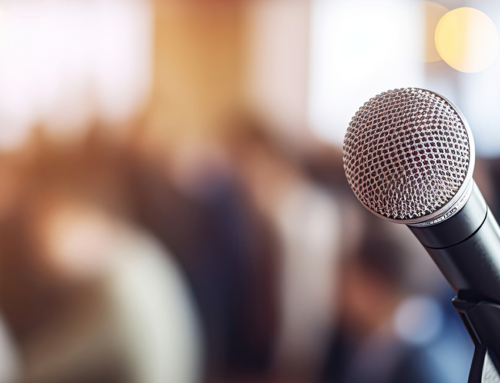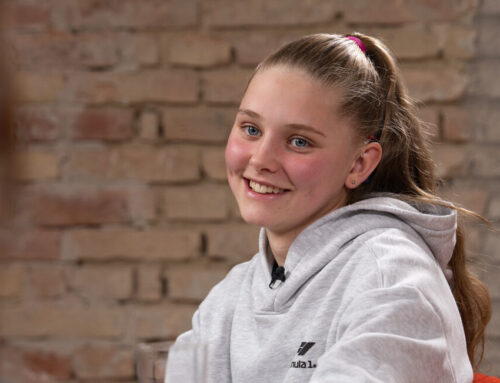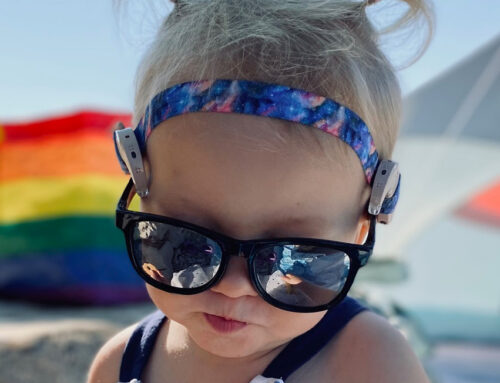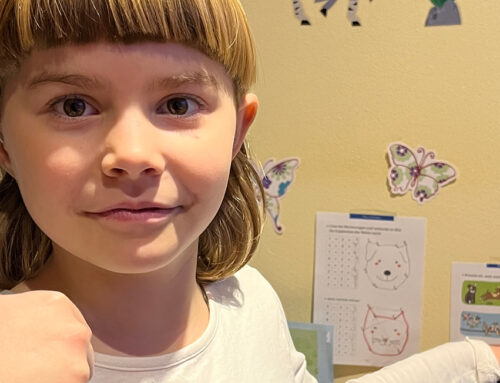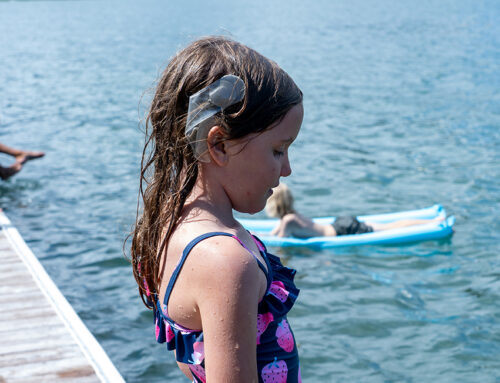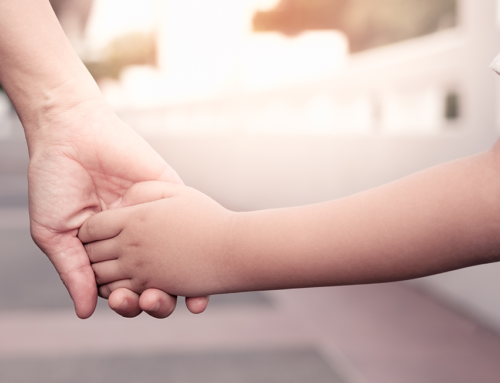What a CI user posts on Instagram about her cochlear implant
Julia Praher was practically deaf on one side when she decided to have a cochlear implant. On Instagram, the young woman shares her experiences with the cochlear implant.
Eva Kohl

"I was so scared before the operation! Afraid of what people would think of me. Afraid of what it would look like. Afraid of what it would be like afterwards. And so much more..." Julia Praher received 127 comments on this Instagram post from May 11, 2023: "When they turned on my RONDO 3, I recognized the first three beeps immediately. [...] Now, on the first day after the adjustment, I heard birds chirping again for the first time. I just cried out of joy..." Since then, the now 33-year-old has been on her journey back to hearing.
This journey began with a visit to the movies in 2016, "There was a shooting scene", no louder than usual on TV or in the movies. Nevertheless, Praher suspects: "That must have been the deciding factor. The next morning, I felt numbness from my left ear to my jaw. And my boyfriend at the time asked me: What are you hearing so badly today?"
"I don't usually go to the doctor for every little thing. I thought maybe it would go away." Three days later, the young woman did go to the ENT department at Kepler University Hospital. "They did a hearing test with me straight away. And then they told me that I had a sudden hearing loss." Julia Praher remained an inpatient at the hospital for five days, but even infusion therapy was unable to restore her hearing.
"I learned from the crisis!"
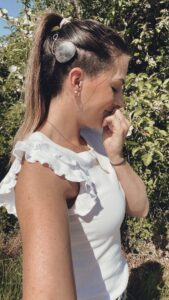
"I love my cochlear implant," says Julia Praher under this photo. "I see it as a second chance in my life." ©private
"Like others who quickly get a sore throat or stomach ache, my ears were sensitive from an early age," says the young woman. So she was not surprised that her mother had no problems after the bang in the movie. If your hearing suddenly deteriorates significantly without a comprehensible trigger, experts speak of sudden hearing loss. Strictly speaking, the term stands for specific sensorineural hearing loss, but as an umbrella term it refers to sudden hearing loss from various causes.
It is not yet clear exactly what can trigger such a sudden hearing loss. Noise is less considered by experts, but various factors ranging from stress, certain viral diseases or inflammation of the auditory nerve, to the degeneration of sensory cells, to a metabolic disorder or circulatory disorder in the inner ear or autoimmune processes.
The care assistant was under a lot of stress at the time: "I was convinced: I have to work, I have to function!" But it was precisely during this crisis that she learned to pay attention to her own needs. "Before that, I didn't allow myself to rest in between," she recalls. "You should be much more considerate of yourself, that's what I learned back then." She changed her job and her private life also changed. But she couldn't really come to terms with the hearing problem itself.
How Julia Praher practises listening
"The best training is to wear it from early in the morning until late at night." CI users can play the exercises in the ReDi training app directly into the CI processor via Bluetooth and thus train one ear specifically. Praher's favorite ReDi exercises: "I think the ones with the sounds are a really good learning method." She also trains her left ear specifically when watching television by using the streaming option. But the most important exercise is to take on the everyday challenges of listening: "Consciously go out and meet people. Consciously sit so that people are on the not-so-good side."
For more hearing training practices, click here!
"I was really ashamed."
"Normally you only know that from senior citizens or..." Julia Praher leaves the sentence unfinished. The then 26-year-old was only persuaded to get a hearing aid in order to reduce the noise in her ears. Tinnitus - the technical term for hearing sensations that cannot be attributed to an external sound source - is a common side effect of sudden hearing loss. Scientists suspect that the brain uses it to compensate for the lack of auditory sensations in the sound ranges directly affected by the hearing loss.
Scientists suspect that the brain compensates for the lack of auditory sensations in the areas directly affected by the hearing loss.
Although the hearing aid did not help against this tinnitus, it was able to compensate well for their hearing loss in the first few years. At least in quiet surroundings, during conversations in small groups. "I still had to be careful around lots of people, with background noise. I often had to ask questions. And I also misunderstood a lot of things," even though my hearing on my right side was intact. "Over time, I even started lip-reading."
Praher actually enjoys meeting up with friends or going to fun parties. But as her hearing in her left ear continued to deteriorate: "I didn't want to go out anymore because I was so afraid. You're really under pressure because you have to be so careful. I no longer felt integrated and isolated myself."
Until it became too much for her. That was at the office Christmas party in 2022. "There were 30 of us there. It was packed. There was loud music in the background. And everyone was talking over each other. That was so awful for me - that was the decisive moment." She went to Kepler University Hospital again, this time to register for a cochlear implant. Her CI system was activated on May 10, 2023. "I can already say that I am 100% happy with my decision and am looking forward to the future - because there is hope for a better quality of life again," the CI user summed up on Instagram the day after the CI activation.
"The implant has given me back my life quality!"
Of course, the device did not go unnoticed by the care assistant's patients. One 75-year-old lady even asked: "What kind of head jewelry are you wearing?" After Praher had explained the CI, the senior citizen wondered: "Do you hear so badly already?" "No, not any more!" was Praher's reply. Of course, the new CI user first had to learn to hear properly again with the implant. But now she is beaming: "I'm thriving again! I'm alive again! I can do what I want again. I see this as my second chance in life."
That's why the young woman, who has even started studying, wants to encourage other sufferers. "Nothing ventured, nothing gained: I hope that my right ear remains intact. But if not, I would also have the implantation on the right." If you would like to find out more about Julia Praher's hearing story, you can follow @_july__ on Instragram or contact her as a hearing consultant at www.hoerverlust.at.
 Get to know Julia Praher!
Get to know Julia Praher!
Go and follow Julia Praher on Instagram under @_july__ or contact them on the information and advice platform Leben mit Hoerverlust.at at https://www.hoerverlust.at/berater/julia/.

